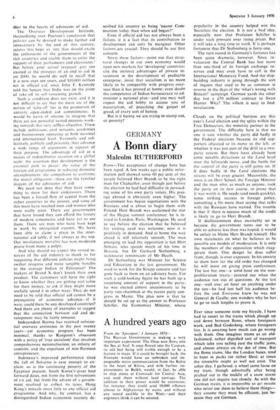GERMANY
A Bonn diary
Malcolm RUTHERFORD Bonn—The acceptance of change here has been rapid. A few weeks ago a public infor- mation poll showed some 60 per cent of the people believed Herr Brandt to be the right man for Chancellor, even though just before the election he had had difficulty in persuad- ing some of his own party voters. His pres- tige abroad is obviously even higher. The government has begun negotiations with the Russians and is about to begin them with Poland. Herr Brandt was acclaimed the star of the Hague summit conference: he is in- vited to London, Paris, Washington. He used to say before the election that he believed his visiting card was welcome; now it is positively in demand. And at home the way ahead is still relatively smooth. The man emerging to lead the opposition is not Herr Strauss, who spends much of his time in Bavaria, but Dr Gerhard Stoltenberg, a technocrat reminiscent of Mr Heath.
Dr Stoltenberg was Minister for Science and Education in the last government. He used to work for the Krupp concern and has gone back to them on an advisory basis. For such a cold-looking figure he has built up a surprising amount of support in the party; he was elected almost unanimously to be party vice-chairman at the recent party con- gress in Mainz. The plan now is that he should be set up as the answer to Professor Schiller, the Economics Minister, whose popularity in the country helped win the Socialists the election. It is not a bad idea, especially now that Professor Schiller is under such pressure over rising prices. But it will take a long time to work. It is perhaps fortunate that Dr Stoltenberg is forty-one.
The turn-round in Germany's fortunes has been quite dramatic, however. Since re- valuation the Central Bank has lost more than one-third of its foreign exchange re- serves and may even have to call in the International Monetary Fund. And the ship- building industry is going through the sort of inquest that used to be so common in reverse in the days of the 'what's wrong with Britain?' campaign. German yards the other day lost a £50 million contract to Swan Hunter. Why? The villain is easy to find: revaluation.
Clouds on the political horizon are this year's Land election and the splits within the Free Democrats, the minority partner in the government. The difficulty here is that no one is sure whether the party did badly in the Federal elections because its old sup- porters objected to its move to the left, or whether it was just part of the drift to a two- party system. But there have already been some notable defections at the Land level over the leftwards move, and the battle for the control of the party is still going on. If it does badly in the Land elections the strains will be even greater. Meanwhile, the onus is on Herr Scheel, the Foreign Minister and the man who, as much as anyone, took the party on its new course, to prove that it was worth it. He needs (and needs quickly), some striking success in foreign policy, something a bit more than saying that talks with the Russians have started. The trouble is that if there is success much of the credit is likely to go to Herr Brandt.
If disillusionment does inevitably set in because the government turns out to be able to achieve less than was hoped, it would be unfair to blame Herr Brandt himself. His own statements on what he believes to be possible are models of moderation. It is only the members of the opposition which exag- gerate them. One danger he does suffer from, though, is over-exposure. In his anxiety to show how far the old order has changed he will insist on giving press conferences. The last but one—a solid hour on the non- proliferation treaty—petered out when the audience ran out of questions. At the last one—well over an hour on anything under the sun—he had lost half his audience be- fore the end. Everyone knew he was not General de Gaulle; one wonders why he has to go to such lengths to prove it.
Ever since someone stole my bicycle, I have had to resort to the trams which plough up and down between Bonn. where foreigners work, and Bad Godesberg, where foreigners live. It is amazing how much can go wrong with them. One imagines trams as an old- fashioned, rather dignified sort of transport which take you sailing past the traffic jams, and almost always on the dot of time. But the Bonn trams, like the London buses, tend to hunt in packs (or rather files); at times the timetable might as well not exist. The other day, I gathered, a wheel came loose on my tram, though admittedly after being pitched out in the middle of a snow storm one did not inquire too closely. As with the German trains, it is impossible to get people who never use them to believe these things— they assume they must be efficient, just be- cause they are German.














































 Previous page
Previous page